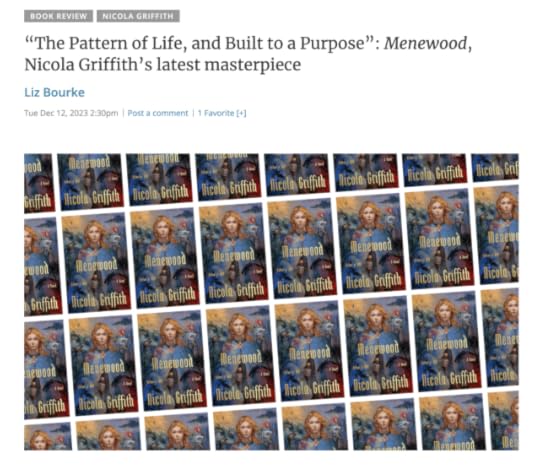The pattern of life, and built to a purpose

I’ve just read a lovely long review of Menewood by Liz Bourke over at Tor.com. She focuses on three things. The first is something that comes up often: the occasional hyper-reality of immersion.
Griffith roots her novel so closely and so tightly in the rhythms of that antique world, its sounds and smells, its textures, its necessities and its uncertainties, that it begins to seem more real than any other truth.
Liz Bourke, tor.com
Then there’s a lot about how I excavate emotion (many elisions to avoid spoilers—which Bourke kindly marks in the review, so proceed with confidence):
Griffith has published only a handful of novels, but each of them has been in some way extraordinary. She writes with a clarity of expression, precision, and force that few writers of my experience can equal, and with the unflinching ability to look at both the terrible and the tender things that people do, and treat them as sides of the same coin. Griffith has a gift for excavating the most raw of human emotions … scenes that made me close the book and weep great gasping sobs … lines and paragraphs that will haunt me for years. Griffith has an incredible talent.
Liz Bourke, tor.com
She also examines power. I’ve always known that Menewood is very much concerned with Hild’s understanding of and relationship to power, but Bourke points out, rightly, I think, that:
Menewood is continuing a conversation about power that, I think, Griffith may have been having for her entire career: what kinds of power are open to different people, what it means to have power (violent or otherwise), what it means to use it, or to refrain from using it, to achieve one’s own will.
Liz Bourke, Tor.com
In some of my work this power differential is based a variety of identities—for example class in Slow River, and Spear, or disability and access (So Lucky)—but as far as I’m aware it’s never based on gender or sexual orientation or skin colour. Those are conversations that are necessary in the real world, but when it comes to fiction I like to offer a space that’s free of that, just for a little while. In Menewood my focus is on how power works and the consequences of assuming it or refusing it.
The review wraps nicely:
I deeply admire this book … It is a truly impressive novel, a thoughtful, thought-provoking, deeply compelling work of art, and one that I expect I will return to many times in the coming years. Griffith has added another piece to the masterwork that is Hild’s story, one every bit as impressive and magnificent as that which preceded it. I recommend it wholeheartedly.
Liz Bourke, Tor.com
This is one of those reviews whose whole is greater than the sum of its parts—at least for me (though of course most people won’t have nearly as much invested as the author), and repays a read.



